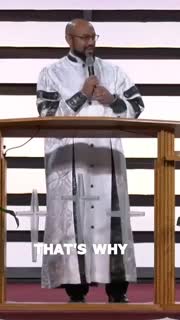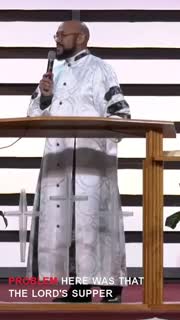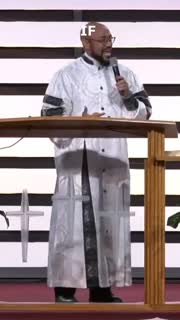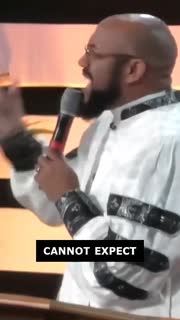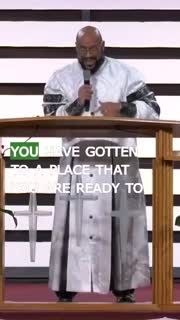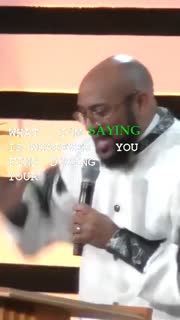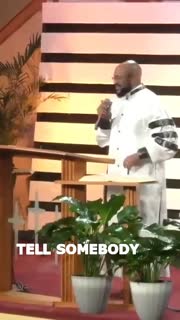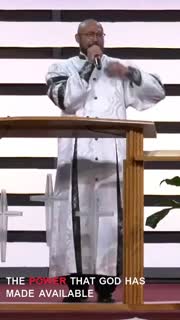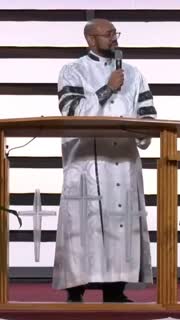Walking in Covenant: Love, Unity, and Empowerment
Summary
### Summary
In today's sermon, we delved into the profound significance of walking in covenant with God, particularly through the lens of 1 Corinthians 11:28. The scripture urges us to examine ourselves before partaking in the Lord's Supper, emphasizing self-reflection and community unity. We explored how love, as Dr. Martin Luther King Jr. described, is the most durable power in the world and is central to our mission of loving God, loving people, and making disciples. This love must be participatory and active, not just a passive feeling.
We discussed the socioeconomic disparities in the Corinthian church, where the wealthy were excluding the poor from the Lord's Supper, leading to division and competition. This exclusion is a stark reminder that the Lord's table is about inclusion and community, reflecting God's patience and love for us. We must engage actively in love, overcoming past hurts that promote present disengagement. Just as salt must leave the shaker to season food, we must leave our comfort zones to make a difference in the world.
Patience, as Paul describes, is the capacity to endure suffering without getting angry or upset. This patience is crucial in our walk with God and in our interactions with others. We must let go of pride and past hurts to engage fully in the community and in God's work. Self-examination is key before partaking in the Lord's Supper, ensuring our hearts are in the right place and our actions are led by God's love.
Ultimately, we are empowered by the same power that raised Jesus from the dead. This power enables us to overcome any challenges revealed during our self-examination. We are called to walk in covenant authority, examining ourselves, engaging in community, and being empowered by God's love and grace.
### Key Takeaways
1. Self-Examination Before Communion: The act of self-examination before partaking in the Lord's Supper is crucial. It requires a thorough and honest inspection of our beliefs, behaviors, and motives to ensure we are in alignment with God's will. This self-reflection helps us engage in the community with a pure heart and right intentions. [25:55]
2. Active Participation in Love: Love is not just a feeling but an action that requires engagement. We must move beyond talking about issues to actively participating in solutions. This means being the salt of the earth, making a tangible difference in our communities, and not just critiquing from the sidelines. [07:59]
3. Overcoming Past Hurts: Past hurts can promote present disengagement, causing us to withdraw from community and God's work. We must confront and heal from these past wounds to fully engage in the present. This healing process is essential for personal growth and community unity. [11:57]
4. Patience and Endurance: Patience is the ability to endure suffering without becoming angry or upset. It is a vital aspect of our Christian walk, especially when waiting on God's timing. This patience allows us to love others genuinely and engage in God's work without frustration. [14:24]
5. Empowerment Through Christ: We are empowered by the same power that raised Jesus from the dead. This empowerment enables us to overcome any challenges revealed during our self-examination. It gives us the strength to break free from past stereotypes, negative thoughts, and any form of bondage, allowing us to walk in covenant authority. [29:09]
### YouTube Chapters
[0:00] - Welcome
[02:24] - The Power of Love
[03:49] - Socioeconomic Disparities in Corinth
[04:58] - The Lord's Supper and Inclusion
[06:11] - The Importance of Patience
[07:59] - Active Participation in Love
[09:53] - The Danger of Disengagement
[11:57] - Overcoming Past Hurts
[14:24] - The Meaning of Patience
[16:08] - The Walmart Analogy
[19:43] - Waiting on God's Timing
[21:27] - Letting Go of Pride
[23:47] - Unity at the Lord's Table
[25:55] - Self-Examination Before Communion
[29:09] - Empowerment Through Christ
[30:43] - Walking in Covenant Authority
[33:18] - Engaging in Community
[35:03] - Conclusion and Call to Action
Study Guide
### Bible Study Discussion Guide
#### Bible Reading
1. 1 Corinthians 11:28 - "Let a person examine himself, then, and so eat of the bread and drink of the cup."
2. Luke 10:27 - "He answered, 'Love the Lord your God with all your heart and with all your soul and with all your strength and with all your mind'; and, 'Love your neighbor as yourself.'"
3. 2 Timothy 1:7 - "For the Spirit God gave us does not make us timid, but gives us power, love, and self-discipline."
#### Observation Questions
1. What does 1 Corinthians 11:28 instruct believers to do before partaking in the Lord's Supper? [25:55]
2. How did the socioeconomic disparities in the Corinthian church affect their practice of the Lord's Supper? [03:49]
3. According to the sermon, what is the significance of love in the mission of the church? [02:24]
4. What analogy did the pastor use to describe the importance of active participation in love? [07:59]
#### Interpretation Questions
1. Why is self-examination important before taking communion, and what might it reveal about our relationship with God and others? [25:55]
2. How can past hurts lead to present disengagement, and what steps can be taken to overcome this? [11:57]
3. What does it mean to be empowered by the same power that raised Jesus from the dead, and how should this empowerment affect our daily lives? [29:09]
4. How does patience, as described in the sermon, play a role in our interactions with others and in our walk with God? [14:24]
#### Application Questions
1. Reflect on a recent time when you partook in the Lord's Supper. Did you engage in self-examination beforehand? How did it affect your experience? [25:55]
2. Think about a situation where you have been disengaged due to past hurts. What steps can you take to heal and re-engage in your community or church? [11:57]
3. Identify a specific area in your life where you need to actively participate in love rather than just talking about it. What practical steps can you take this week to make a difference? [07:59]
4. Patience is described as enduring suffering without getting angry or upset. Can you think of a recent situation where you struggled with patience? How can you approach similar situations differently in the future? [14:24]
5. The sermon mentioned that we are empowered by the same power that raised Jesus from the dead. How can this truth change the way you face challenges in your life? [29:09]
6. Reflect on a time when pride has hindered your ability to engage with others or with God's work. What can you do to let go of pride and fully engage? [21:27]
7. How can you be the "salt of the earth" in your community? Identify one specific action you can take this week to positively impact those around you. [07:59]
Devotional
Day 1: Self-Examination Before Communion
Self-examination is a crucial practice before partaking in the Lord's Supper. It involves a thorough and honest inspection of our beliefs, behaviors, and motives to ensure we are in alignment with God's will. This self-reflection helps us engage in the community with a pure heart and right intentions. By examining ourselves, we can identify areas where we need to seek forgiveness, make amends, or change our attitudes. This process is not about condemning ourselves but about aligning our hearts with God's love and grace.
In 1 Corinthians 11:28, Paul urges believers to examine themselves before eating the bread and drinking the cup. This self-examination is a time to reflect on our relationship with God and others, ensuring that we approach the Lord's table with reverence and humility. It is a moment to remember Christ's sacrifice and to commit ourselves to live in a way that honors Him. [25:55]
1 Corinthians 11:28 (ESV): "Let a person examine himself, then, and so eat of the bread and drink of the cup."
Reflection: What specific areas of your life do you need to examine before partaking in the Lord's Supper? How can you align your heart with God's will today?
Day 2: Active Participation in Love
Love is not just a feeling but an action that requires engagement. We must move beyond talking about issues to actively participating in solutions. This means being the salt of the earth, making a tangible difference in our communities, and not just critiquing from the sidelines. Love, as described by Dr. Martin Luther King Jr., is the most durable power in the world and is central to our mission of loving God, loving people, and making disciples.
Active participation in love involves stepping out of our comfort zones and engaging with those around us. It means showing kindness, compassion, and generosity in practical ways. By actively participating in love, we reflect God's love to the world and build stronger, more united communities. [07:59]
James 2:17 (ESV): "So also faith by itself, if it does not have works, is dead."
Reflection: How can you actively participate in showing love to someone in your community today? What specific actions can you take to make a tangible difference?
Day 3: Overcoming Past Hurts
Past hurts can promote present disengagement, causing us to withdraw from community and God's work. We must confront and heal from these past wounds to fully engage in the present. This healing process is essential for personal growth and community unity. Holding onto past hurts can lead to bitterness and isolation, preventing us from experiencing the fullness of God's love and grace.
Healing from past hurts involves forgiveness, both for ourselves and others. It requires us to let go of pride and resentment, allowing God's love to heal our wounds. By overcoming past hurts, we can fully engage in the present and contribute to the unity and growth of our community. [11:57]
Ephesians 4:31-32 (ESV): "Let all bitterness and wrath and anger and clamor and slander be put away from you, along with all malice. Be kind to one another, tenderhearted, forgiving one another, as God in Christ forgave you."
Reflection: What past hurts are you holding onto that may be causing you to disengage from your community or God's work? How can you begin the process of healing and forgiveness today?
Day 4: Patience and Endurance
Patience is the ability to endure suffering without becoming angry or upset. It is a vital aspect of our Christian walk, especially when waiting on God's timing. This patience allows us to love others genuinely and engage in God's work without frustration. Paul describes patience as the capacity to endure suffering without getting angry or upset, which is crucial in our walk with God and in our interactions with others.
Patience involves trusting in God's timing and His plan for our lives. It means waiting with a hopeful and expectant heart, knowing that God is working all things for our good. By cultivating patience, we can navigate challenges and trials with grace, maintaining our faith and commitment to God's work. [14:24]
Romans 12:12 (ESV): "Rejoice in hope, be patient in tribulation, be constant in prayer."
Reflection: In what areas of your life do you struggle with patience? How can you cultivate a heart of patience and trust in God's timing today?
Day 5: Empowerment Through Christ
We are empowered by the same power that raised Jesus from the dead. This empowerment enables us to overcome any challenges revealed during our self-examination. It gives us the strength to break free from past stereotypes, negative thoughts, and any form of bondage, allowing us to walk in covenant authority. This power is not of our own but is given to us through Christ, enabling us to live victoriously and fulfill God's purpose for our lives.
Walking in covenant authority means recognizing and embracing the power and authority we have in Christ. It involves living with confidence and boldness, knowing that we are equipped to overcome any obstacles and challenges. By relying on Christ's empowerment, we can break free from limitations and live out our calling with purpose and passion. [29:09]
Ephesians 1:19-20 (ESV): "And what is the immeasurable greatness of his power toward us who believe, according to the working of his great might that he worked in Christ when he raised him from the dead and seated him at his right hand in the heavenly places."
Reflection: What challenges or limitations are you facing that require Christ's empowerment? How can you rely on His power to overcome these obstacles and walk in covenant authority today?
Quotes
1. "That's why at the core of our church mission is love God, love people, and then make disciples because if your love isn't right with God and your love isn't right with your neighbor then we will not walk in discipleship because we won't have the power we need to overcome what we need to overcome to walk as believers as Christians and as followers of God because love is an action word." [02:24] (34 seconds)
2. "The problem here was that the Lord's Supper table is about inclusion. It's about making sure that we wait for one another. That all of us recognize that we are in need of a Savior. That all of us are in need of saving. That none of us are that great and that mighty, that holy and that good to where we don't need this table. And when you exclude someone, when you don't wait, it is being very nearsighted and forgetting that God waits for us." [06:11] (40 seconds)
3. "If the salt never makes contact with the food then it does not change the flavor if your salt just stays in the bottle it can talk about the food all day you know that food is so bland that food needs some seasoning that food but the salt has the power to change the taste but it will never change the taste of the chicken unless it makes its way out of the bottle and on to the food which means you've got to move from where you were comfortable around all the other salt and put yourself in the position where you can change an environment that looks different than your last environment." [07:59] (45 seconds)
4. "We cannot expect other people to be the salt when God has called us to be the salt we're disengaged and do you want to know one of the reasons why we're disengaged brace yourself it's because past hurt promotes present disengagement let me say that again it got real quiet on the right side back so let me let me let me let me toss it back over there let me uh i said past hurt promotes present disengagement because of what i went through back here because of how they treated me back here because of what happened when i tried last time because of how the church folk treated me when i when i tried my because of how they talked about me at that job because i tried and failed the last time i tried to pursue that degree because i got hurt in that last relationship because of what i've been through." [11:57] (80 seconds)
5. "You have gotten to a place that you are ready to love others, but others aren't ready to love you back. You've gotten to a place where ready to forgive, but they're not ready to forgive. You've gotten to a place where you are ready to elevate, but there does not seem to be space for your elevation. But my Bible tells me that God will make room. My Bible tells me that if we are faithful over the little, God will make me ruler over the much. Maybe in this season, sometimes we have to accept that we've got to be faithful and patient and wait because you will make it as long as you faint not." [19:43] (42 seconds)
6. "What I'm saying is whatever you find during your self-examination, this table is a reminder that you have the power to overcome it, to defeat it, to break it, to get rid of it because he has overcome the world. He was tested in every way. And because of the power that's in Jesus, we are reminded before I drink of this cup and eat of this bread, that the same power that raised Jesus from the grave, the same power that enabled him to hang on that cross, the same power that allowed him to bear my sins, the same power that kept him, even when he was asking father, let this cup pass." [29:09] (39 seconds)
7. "Tell somebody you've been empowered. Empowered to be the head and not the tail. Empowered to be above and not beneath. Empowered to be beautifully and wonderfully made. Empowered. Empowered to break the chains that the devil tries to lock up and shackle up on you. Empowered to break negative negative past stereotypes and negative past bondage over your mind. You've been empowered. Luke said behold I give you the authority to trample on serpents and scorpions and over all the power of the enemy and nothing shall by any means hurt you. Tell somebody the devil can't even hurt you." [30:43] (47 seconds)
8. "The power that God has made available to me allows me to love in a way I never loved before. Allows me to walk in a way I never walked before. His love. His love empowers me to talk differently, pray more, study his word, and never give up. Do I have any witnesses in the house today who've been empowered, you engaged, you've examined, and now the Lord has set you free. Nobody's opinions set you free. But the opinion of the Lord who says you're his child, my daughter, my son, I will be who God called me to be. I will have what God says I can have and I will do what God says I can do." [33:18] (66 seconds)
9. "Engage. yourself. Before we come to this table, a heart to heart with why you need this table in the first place. And be empowered to know whatever came up during your self-examination, his blood covers. Family, that's how we don't abuse this table. That's the reason why before the deacons partake. They take the gloves off. It's symbolic of understanding that although they served you, they too are in need of the same supper. Though I am your pastor, I am just a man. I am in desperate need of this table just as much as any of you. we all realize we all need it, collectively we can come and receive it a community broken by this world. But healed and united by God." [35:03] (106 seconds)
